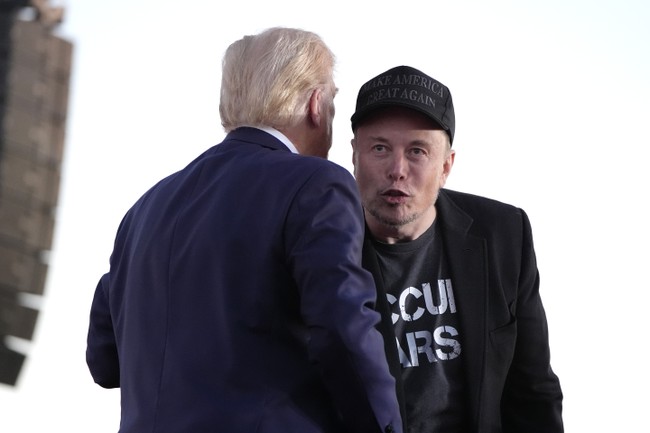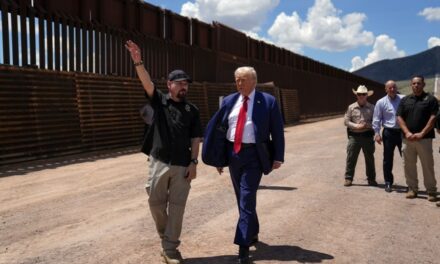We support our Publishers and Content Creators. You can view this story on their website by CLICKING HERE.

My wife isn’t an American citizen: She’s Dutch. (So I guess it’s true, foreigners really are doing the “work” that native-born Americans refuse to do.) She was raised in French Polynesia, earned her master’s in accounting from the University of Hawaii, and when we moved to Charleston, South Carolina, a local accounting firm sponsored her H-1B visa.
Advertisement
It sucked. She couldn’t be paid until the application was approved and it tethered her to one single company. She worked without pay for several months.
I offer this backdrop for an important reason: The MAGAverse is currently being divided by the H-1B visa debate. On one side, there’s Elon Musk and Vivek Ramaswamy, along with most of the Big Tech movers and shakers. (Which makes sense: Companies like Google, Microsoft, Apple, and Amazon are America’s top H-1B visa sponsors.)
On the other side, you have Steve Bannon and most of the grassroots MAGA movement, who question how and/or why increasing the number of foreign workers in lucrative, high-paying STEM jobs aligns with “Making America Great Again.”
To be fair, this doesn’t have to be a conflict. One of the key institutional advantages of the United States is that the top international talent would sell their wisdom teeth to live here. We’re the ultimate go-to destination for the smartest, most ambitious workers in the world: The annual number of H-1B visas is capped at 85,000.
In 2020 (the most recent year with recorded stats), 421,276 applied.
An overwhelming majority of Americans would be delighted to welcome a small number of high-achievers into our country. Immigrants like Elon Musk are unquestionably a net positive. So, in this (narrow) sense, H-1B visas actually are aligned with Making America Great Again.
Advertisement
Unfortunately, Musk and Ramaswamy have unnecessarily conflated the H-1B visa debate with a meanspirited critique of American culture, American children, and American parents. As Ramaswamy tweeted:
Our American culture has venerated mediocrity over excellence for way too long (at least since the 90s and likely longer). That doesn’t start in college, it starts YOUNG.
A culture that celebrates the prom queen over the math Olympiad champ, or the jock over the valedictorian, will not produce the best engineers.
Ramaswamy has a point; he’s a very smart man. But for PR purposes, his tweet was stupid. He should’ve accentuated the (patriotic) benefits of the program, instead of detouring into an admonishment of American families.
It was a foolish misstep.
Most Americans are proud of their kids. As a parent, I’d rather have a great kid than a great engineer. It’s my job to raise a child with the wisdom, values, and discipline to achieve his dreams — wherever it takes him.
Even if his dreams are different from Ramaswamy’s.
Other than the gigantic tech companies, the other beneficiaries of the H-1B visa program are India and China. Seventy-two percent of H-1B visa recipients were from India; 12% from China.
That’s 84% of the total number.
Advertisement
DEI stands for diversity, equity, and inclusion. It’s intended to boost the number of “minorities” in an organization or institution. And at least 84% of the time, that’s exactly what the H-1B program produces!
In some ways, the H-1B program is the most successful DEI initiative in American history… assuming you define “success” as being in the financial interests of corporate America. There’s a reason why tech CEOs are huge fans.
Question #1: Of the 85,000 H-1B jobs that are annually awarded to international applicants, how many would’ve been staffed by native-born Americans if the program didn’t exist?
It’s possible, of course, that these international applicants really do have a better education. But they probably earned that education from an American college: Over 850,000 international students are currently enrolled in U.S.-based academic programs, including at all our leading universities!
Question #2: If we limited foreign enrollment in U.S. colleges to “just” 750,000 international students, so we could teach, train, and educate an additional 100,000 American citizens in STEM professions each year, would we still need 85,000 H-1B visas?
Question #3: If our national objective is to “poach” the top global talent, why does it make sense to tie an H-1B visa holder to a single company, where he or she could be mistreated? Wouldn’t it be better for them AND us if they could work where they wanted?
Advertisement
The H1-B program has a legitimate purpose. It would be economically disastrous to seal our borders from ambitious, talented immigrants. But the current program is a DEI program in disguise. It hurts native-born Americans AND foreign-born visa-holders, and disincentivizes American companies, industries, and universities from optimizing their homegrown talent.
Unless — and until — the entire program is radically overhauled, it has no place in the MAGAverse. There’s nothing MAGA about it.

 Conservative
Conservative  Search
Search Trending
Trending Current News
Current News 







